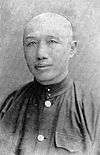Leong Fee
Leong Fee (simplified Chinese: 梁辉; traditional Chinese: 梁輝; pinyin: Liáng Huī; Hakka Pha̍k-fa-sṳ: Liòng Fî) is the Hakka name for Liang Pi Joo (1857–1912), a worker from Guangdong in China who emigrated to Malaya in 1876.
Leong Fee | |
|---|---|
 Leong Fee | |
| Born | Liang Pi Joo 1857 Guangdong in China |
| Died | 1912 |
| Occupation | Tin miner, businessman, politician |
| Known for |
|
Career
He arrived in Penang and, half a year later, moved to Perak where he began to make his fortune in tin. He was a tin miner, businessman, a visiting Justice for Kinta (1892), the first Chinese Member of the Federal Legislative Council (1909)[1] a Penang state senator, a member of the Perak State Council, a Chinese Vice-Consul to Penang (1902 to 1908) and a philanthropist.[2] He was a member of the Society for the Encouragement of Arts, Manufactures and Commerce.[3]
In 1902 he opened a mine in Tambun. Renowned Malaysian businessman Leong Sin Nam once worked in his tin mine.[4] One year later Tambun held the world record for tin production.[5]
Leong Fee Mansion
Built on Leith Street around the 1900s as a personal residence, it now belongs to the Christian Brothers and has been leased to an art school, Akademi Seni Equator.[6]
Hakka Chinese Tin Miners Club
Leong Fee founded the club in Ipoh in 1893. His son, Leong Yin Khean alias Liang En-Chuen, continued to sponsor the lodge after his father's death in 1912 and eventually sold the house cheaply to the club.[7] He was a member of the Society for the Encouragement of Arts, Manufactures and Commerce.[3]
Personal life
He married the daughter of millionaire-philanthropist Hsieh Yung-kuan, the Chinese Vice-Consul to Penang before him.[7]
References
- Generations: The Story of Batu Gajah By Tak Ming Ho, Perak Academy Published by HO TAK MING, 2005; ISBN 983-40556-5-X, ISBN 978-983-40556-5-3; pp. 105, 113, 117, 119, 120, 132
- Days Gone By: Growing Up in Penang By Christine Wu Ramsay, South Yarra: Macmillan, 2004
- Virtual Malaysia, The official ePortal of Tourism Malaysia Archived 19 November 2005 at the Wayback Machine
- Everitt, W.E. History of Mining in Perak. 1952. Vols. 14, Page 60
- Ipoh Echo, July 2007
- John Glines
- The Official Website of Tourism Penang by The Penang Tourism Action Council